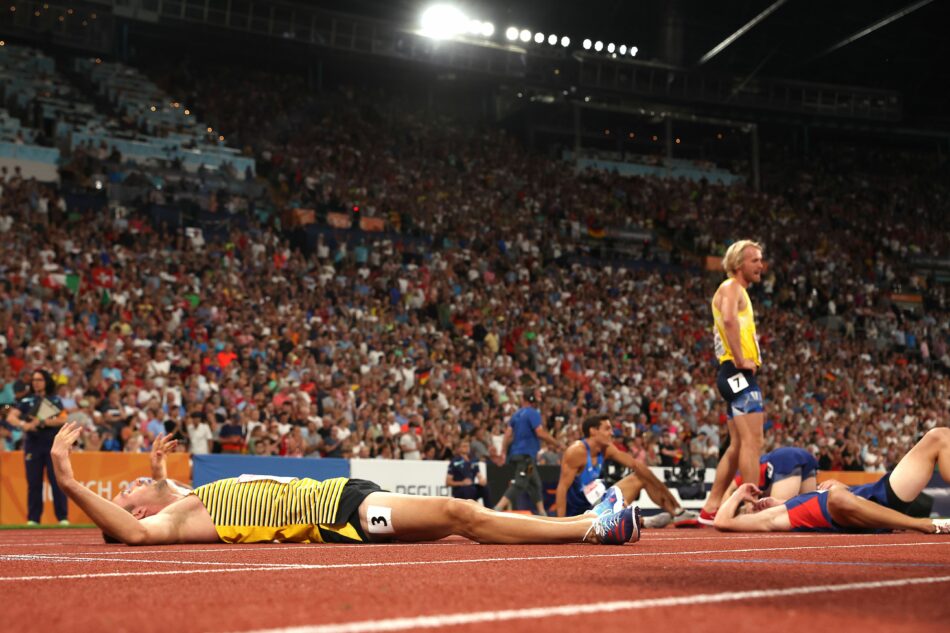
The second evening of competition at the European Championships served up a treat and provided another reminder that there’s nothing quite like a big – emotionally invested – sporting crowd
I closed the hotel room door and fell face first on to the bed. It was now the early hours of Wednesday morning and it had been a bit of a shift. Sleep, however, was going to prove tricky.
My ears were still ringing, my brain (or the part of it that hadn’t dripped out of my ears by this point) was still processing everything that had gone on during one of the most memorable evenings of sport I’ve ever had the privilege to witness. It was breathtakingly good.
Munich’s Olympic stadium is stark. The swooping, translucent roof is a thing of beauty but otherwise – and perhaps not surprisingly for a 50-year-old venue – there are no frills to the vast bowl which unfolds in front of you as you enter the arena.
There are even fewer adornments to the mixed zone – the media gauntlet through which the athletes walk after performances good, bad or ugly – down in the depths of the facility. It was there that I found myself on the morning of day two of these European Championships. Multi-tasking is the order of the day during an event like this and, as I waited to talk to a couple of athletes, I pulled my laptop out of my bag and sat down on the floor to get some writing done.
I was not alone, though, and exchanged a few knowing glances with the British media colleagues who were doing exactly the same thing. “Oh, the glamour,” we laughed as we took in our concrete-filled surroundings.
Before you start hearing the tiny violin playing, though, I should quickly point out that this is in no way a complaint or an attempt to draw any form of sympathy. There is definitely a side to working at major sporting events which those on the outside simply don’t see – one which involves plenty of endurance and an awful lot of hours – but I will never stop reminding myself of just how fortunate I am to be paid to cover such things. Especially when I am able to observe an evening such as August 16, 2022.
When I saw world 200m champion Noah Lyles dancing with a giant squirrel to a remix version of The Way to Amarillo, I suspected it might be a night to remember. My instincts proved to be right.
As was the case with any of home nations athletes at the Commonwealth Games, anyone in a Germany singlet is being greeted with a roar of approval from the Munich crowd… regardless of how well or how poorly they have done. During the morning events of the men’s decathlon, defending champion Arthur Abele appeared to have been disqualified from the 110m hurdles but was reinstated at short notice and allowed to run solo. As my AW colleague Steve Smythe pointed out, surely there has a never been such a reaction to a run of 14.50.
And so it continued into the night. In that same decathlon, Niklas Kaul, trying to claw back ground on leader Simon Ehammer, threw the javelin 70 metres. The stands erupted. Clearly inspired, he added a further six metres on to his next attempt and the crowd burst into song. When he completed the 1500m and one of the most astonishing combined events performances ever, the watching public almost didn’t know what to do with themselves. Neither did he.
Niklas Kaul (Getty)
Before the athletics competition had begun in Munich, there had not been encouraging noises. Ticket sales were poor, marketing had not been extensive and hopes of attracting the masses had not seemed particularly high. The night of the 100m finals is usually a good gauge to see just how much of an impact a championships is having, though, and on that basis, seeing that near-capacity turnout on day two will have gladdened the hearts of many in the sport.
Germany tends to host very, very good events and that the spectators have become such a feature, such key players, in all of the events has simply added another dimension. The light shows and thumping soundtrack ahead of each of the sprinting showpieces attacked the senses but I’ve seen that trick tried before and it really doesn’t work unless the people in the seats want to join in with it all. Before Marcell Jacobs and then, remarkably, Gina Lückenkemper struck 100m gold, the stadium throbbed and the air fizzed with wave upon wave of noise.
There are still five days to run on the athletics competition in Munich, of course, during which time the picture and the perception may change. Jacob Fincham-Dukes and Dina Asher-Smith won’t look back on it fondly, while there are wider questions to be addressed too about how athletics can harness all of this attention and momentum and use it to grow. For the moment, though, let’s simply enjoy the fact that, just as in Birmingham, the masses are revelling in this festival of live sport and that, crucially, it seems they want more.















 Phone: (800) 737. 6040
Phone: (800) 737. 6040 Fax: (800) 825 5558
Fax: (800) 825 5558 Website:
Website:  Email:
Email: 






